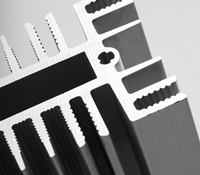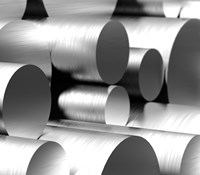Skladování a manipulace

Broadly speaking, aluminium is a robust material that is easy to handle. However, it requires a few simple precautions if you want to maintain the quality of the material.

In cases of damaged aluminium, the damage usually occurs during transport - often as scuff marks and scratches. Minor transport damage does not affect the mechanical properties of the metal, but it can cause problems if you plan to add a surface treatment.
Scratches and fretting will usually remain visible after anodising. However, in some cases, minor damage can be hidden by mechanical surface treatment such as polishing or sandblasting.
To avoid these types of damage, it is important to protect the aluminium with heavy duty packaging paper, plastic or bubble wrap when moving and transporting it.

Many people are unaware that water and moisture can discolour an aluminium surface.
Moisture damage appears as white spots or dark discolouration. It typically occurs if water or condensation is trapped between stacked aluminium items or if the items are very close together.
To avoid this, it is important to dry aluminium before storing it. If the aluminium is very wet, wipe it off with a cloth first. It is important to separate the items while drying so that the moisture can evaporate.
Condensation during winter
Condensation is a common moisture problem in the winter. During many hours of transport in a cold truck, the aluminium cools down to a low temperature. If it is moved directly into a heated warehouse, condensation will form on the surface.
Therefore, we recommend that you leave the aluminium items in their original packaging for 36-48 hours to slowly warm up to the temperature of the warehouse. After this the material can be unpacked and placed in storage.

General tips for storage
If you store aluminium outdoors, there is a risk of corrosion due to air pollution. We typically see air pollution in urban or industrial areas, and this is enough to accelerate pitting of the metal's surface.
We also recommend that aluminium does not come into contact with other metals during storage. Not only does this increase the risk of damage and marking, but it can also lead to galvanic corrosion. Galvanic corrosion occurs when aluminium comes into contact with a more noble metal through water or moisture.

















